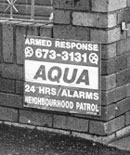
Hired
Guns
South Africa's crime-weary suburbanites
trust private security more than the police.
By David Gilson
JOHANNESBURG, South Africa, March 29 — It's almost midnight on an unusually cool autumn night in Johannesburg. Patrick Hannay drives through the city's northern suburbs in a tiny white sedan, looking for signs of trouble. He keeps a 9mm semiautomatic pistol wedged beneath his legs. He's supposed to be wearing his bulletproof vest, but tonight he left it in the back seat. "It doesn't feel nice," he says.
He drives down dark lanes lined with ten-foot walls topped by barbed wire and electric fencing. Here in the country that is routinely called the crime capital of the world, these heavily fortified enclaves are typical suburban homes. Behind the walls, many homeowners have additional security features, such as burglar bars, alarm systems, motion-sensitive floodlights and guard dogs. Hannay says most people probably own a gun.
If any of these elaborate precautions actually worked, Hannay wouldn't be here. "Nothing stops them from coming in," he says. As the supervisor of a 17-car armed response team that patrols affluent, mostly-white neighborhoods such as Sandton, Rivonia and Morningside, Hannay's job is to keep "them" out.
"If you see someone suspicious, you stop them immediately," says Hannay. He is allowed to stop pedestrians and make arrests, as long as he turns suspects over to the police within four hours. How does he distinguish between burglars on the prowl and people whose only crime is being black in the middle of the white suburbs? "When you've got my experience, you can tell from the way someone is walking," he says.
|
One of the many private security firms that affluent South Africans hire for protection. Photo by Dave Gilson. |
The 31-year-old Hannay, who is white, works for Coin Security, one of about 2,500 private security firms in South Africa. For 250 Rand ($38) a month, Coin promises its clients that one of its teams will arrive on the scene within ten minutes of receiving a distress call. In the gated communities where Hannay's team works, the average response time is three minutes or less.
Many South Africans do not trust the country's beleaguered police force to respond to their emergency calls. Those who can afford it hire private firms like Coin to supply peace of mind. "If SAP [South African Police] could respond quickly, there'd be no need for us," says Hannay's boss. He says that in some neighborhoods security cars outnumber the police ten to one.
Last year, the police reported almost 24,000 murders, making the country's murder rate more than ten times that of the U.S. Gauteng Province, where Johannesburg is located, has the country's highest incidence of robbery, rape and murder. In the city's suburbs, armed response teams are often the first to deal with muggings, carjackings, break-ins and shootings. The police show up afterward to handle the paperwork and clean up. Hannay says simply, "We take the bullet before the police."
He stops his car on the edge of Marlboro, one of the last ungated neighborhoods in his patrol area. On his right side, tall grass stretches into the darkness. Hannay looks across the field toward a line of blue lights a kilometer or two away. Somewhere down there are the shacks and shebeens of Alexandra, an impoverished black area that Hannay describes as "one of our dangerous townships." He warily watches the no-man's-land between the two worlds, one wealthy and white, one poor and black, held apart by a blank spot on a map.
Tonight, two horrific incidents occur on both sides of the divide. A black couple is shot dead in their home in Alexandra and a white woman is shot and critically wounded while walking to an anti-crime meeting in upscale Rivonia. A day later, The Star writes five sentences about the Alexandra murders, but the Rivonia shooting makes headlines for the rest of the week. Residents tell the newspaper that they are "living under siege" and that they plan to erect gates around the area.
In the popular imagination of suburbia, crime is largely a matter of black perpetrators and white victims. But violent crime affects South Africans of all backgrounds, especially blacks, most of whom do not live in gated communities with 24-hour armed response teams.
"All our clients are really scared," says Hannay. About every fifteen minutes, he gets a panic call over the radio. He turns on his hazard lights and speeds through the empty streets at close to 80 miles per hour. He runs red lights, flies over speed bumps and cuts through gas stations. He's supposed to obey the traffic laws, but his clients expect him to get there as fast as possible. "One minute for us is ten minutes for them," he says.
Most calls turn out to be false alarms: a man who thought he heard gunshots, someone reporting a drunk driver, a kid who accidentally hit the panic button. Other calls are from people who decide a sense of security outweighs racial sensitivity. A white businessman says he recently called armed response to clear away a couple of "suspicious characters" that were hanging out on his block.
As another security-conscious suburbanite explains, "It's not prejudice. It's practical."
